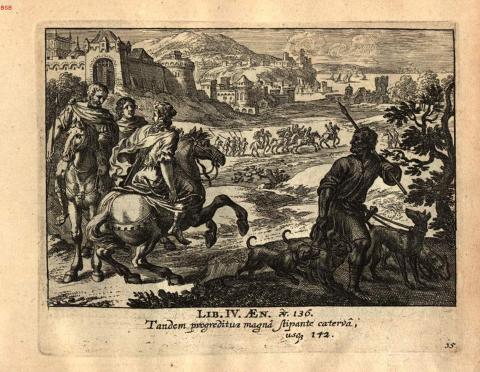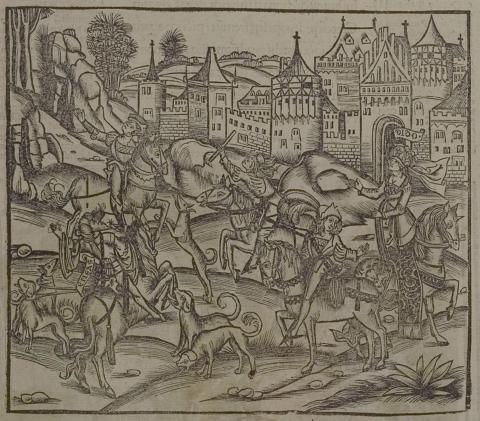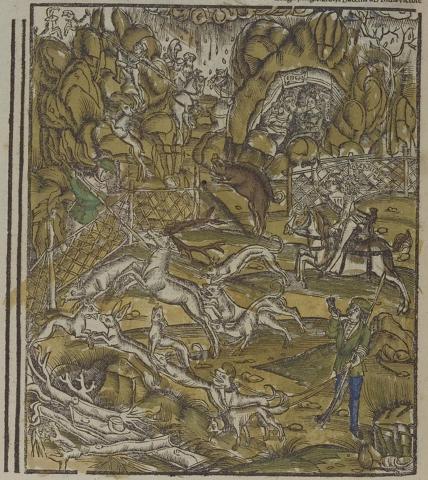CORE VOCABULARY
Ōceanus, ī, m.: the god Oceanus; the waters encompassing the lands; the ocean, 1.287; distinguished as eastern and western, 7.101.
intereā: (adv.), amid these things; meanwhile, in the meantime, 1.418, et al.
aurōra, ae, f.: the dawn, morning, 3.521; personified, Aurora, the goddess of the dawn, who precedes the horses of the sun-god, 4.585; the east, 8.686; the sun, 6.535.
iubar, aris, n.: brightness, radiance, of the sun, or of a star; the sun, morning, 4.130.
exorior, ortus sum, 4, dep. n.: to rise up; come forth, appear, rise, 4.130; arise, 3.128; spring up, arise, 4.625.
dēligō, lēgī, lēctus, 3, a.: to choose from; choose, 2.18. (dē and legō)
iuventūs, ūtis, f.: youthfulness; the age of youth; collective, young people, the youth; warriors, 1.467. (iuvenis)
rēte, is, n.: a net, 4.131.
plaga, ae, f.: a net, hunter's net; a snare, a trap, 4.131.
vēnābulum, ī, n.: a hunting-spear, 4.131. (vēnor)
Massӯlus, a, um: adj. (Massӯlī), Massylian, Libyan, 4.132.
ruō, ruī, rutus, 3, n. and a.: to fall with violence; tumble down, fall, freq.; fall in battle, 10.756; of the sun, go down, set, 3.508; rush forward, 2.64; of the chariot of Nox, hasten up; ascend, rise, 2.250; advance, 10.256; plunge, rush, 2.353; flee, 12.505; tremble, quake, 8.525; hasten, pass away, 6.539; cause to fall; cast down, 9.516; plow, 1.35; cast, throw up, 1.85; throw up or together, 11.211.
odōrus, a, um: adj. (odor), that emits a smell; having a keen sense of smell, keen-scented, 4.132.
rēgīna, ae, f.: a queen, 1.9; princess, 1.273. (rēx)
thalamus, ī, m.: a bedchamber; chamber, 2.503; couch, 6.280; marriage, 4.18; bridals, the bride, 7.388; pl., thalamī, ōrum, nuptials, wedlock, marriage, 6.94.
cunctor, ātus sum, 1, dep. n.: to delay, hesitate, linger, wait, 4.133; keep one's ground, stand at bay, 10.717.
Poenī, ōrum, m.: the Carthaginians, 1.302; Africans, 12.4.
ostrum, ī, n.: the purple fluid of the murex; purple dye, purple, 5.111; purple cloth, covering or drapery, 1.700; purple decoration, 10.722; purple trappings, housings, 7.277.
īnsīgnis, e: beautiful, 3.468; splendid, adorned, 4.134; conspicuous, 6.808; marked, renowned, distinguished, 1.10; illustrious, glorious, 10.450. (in and sīgnum)
sonipēs, edis: adj. (sonus and pēs), noisy-hoofed; subst. m., horse, courser, steed, 4.135.
atque, or ac: (conj.), and in addition, or and besides; and, as well, and indeed, and, 1.575; freq.; even, 2.626; in comparisons, as, 4.90; than, 3.561.
frēnum, ī, n.; in the pl. sometimes frēnī, ōrum: a bit, 4.135; bridle, reins, 3.542; (fig.), 6.100.
ferōx, ōcis: adj. (ferus), wild; impetuous; ferocious, fiery, fierce, 5.277; warlike, martial; proud, 12.895.
spūmō, āvī, ātus, 1, n. and a.: to foam, 3.534, et al. (spūma)
mandō, mandī, mānsus, 3, a.: to chew, bite, champ, 4.135; eat, devour, 3.627; of falling in battle, bite the dust, 11.669.
prōgredior, gressus sum, 3 dep. n.: to go, come forward or forth, 4.136; advance, 3.300; move on, 12.219. (prō and gradior)
stīpō, āvī, ātus, 1, a.: to tread down, compress; pack together, store up, 1.433; load, w. acc. and dat., 3.465; throng around, attend, 4.136.
caterva, ae, f.: a troop, squadron, band, 2.370; crowd, throng, multitude, 2.40; flock, 11.456.
Sīdōnius, a, um: (adj.), of Sidon; Sidonian; Phoenician, Tyrian, 1.678, et al.
pīctus, a, um: embroidered, 1.708; many-colored, speckled, spotted, variegated, 4.525.
chlamys, ydis, f.: a mantle or cloak of woolen cloth, worn by the Greeks; a mantle, 3.484.
circumdō, dedī, datus, dare, 1, a.: to put or throw around; (with abl.), to encircle, surround, encompass, inclose with, 1.368; of dress, gird, 9.462; adorn, 6.207; set, 1.593; border, 4.137; (with dat.), throw around, 2.792; twine or coil around, 2.219; put round, 2.510.
limbus, ī, m.: a border, hem, fringe, 4.137.
pharetra, ae, f.: a quiver, 1.323, et al.
crīnis, is, m.: the hair, 1.480; train of meteors, 5.528; (often in the pl.), the hairs of the head, the hair.
nōdō, āvī, ātus, 1, a.: to tie with a knot; bind, fasten, 4.138. (nōdus)
purpureus, a, um: adj. (purpura), of purple; purple-colored, scarlet, red, purple, 1.337; of blood, 9.349; ruddy, glowing, brilliant, 1.591.
subnectō, nexuī, nexus, 3, a.: to tie beneath; to bind under, 1.492; bind, fasten, 4.139; tie or bind up, 10.138.
fībula, ae, f.: a clasp, brooch, buckle, 5.313, et al. (fīgō)
nec or neque: (adv. and conj.), and not; neither, nor, 1.643, et al.; in prohibition, 3.394, et al.; neque (nec) — neque (nec), neither — nor, 5.21, et al.; nec — et, or -que, may be rendered neither — nor, 12.801; 2.534; nec nōn, and also, nor less, 6.183; nec nōn et, and also, 1.707.
Phrygius, a, um: Phrygian, Trojan, 1.381; subst., Phrygiae, ārum, f., Phrygian or Trojan women, 518. (Phryx)
Iūlus, ī, m.: Iulus or Ascanius, son of Aeneas, 1.267, et freq.
incēdō, cessī, cessus, 3, a. and n.: to step onward; walk, especially with pomp or dignity; advance, 1.497; move (for am), 1.46, et al.; march, proceed, 9.308.
Aenēās, ae, m.: 1. A Trojan chief, son of Venus and Anchises, and hero of the Aeneid, 1.92. 2. Aenēās Silvius, one of the Alban kings, 6.769.
hībernus, a, um: adj. (rel. to hiems), of winter; wintry (others, in winter), 4.143; tempestuous, stormy, 4.309; subst., hīberna, ōrum, n., winters, 1.266.
Lycia, ae, f.: a country on the S.W. coast of Asia Minor, 4.143.
Xanthus, ī, m.: 1. The Xanthus or Scamander, a river near Troy, 5.808, et al. 2. A small river in Epirus named by Helenus after the Trojan Xanthus, 3.350. 3. A river in Lycia, 4.143.
fluentum, ī, n.: a stream, river, 4.143; current, water, 12.35. (fluō)
Dēlos, ī, f.: an island in the midst of the Cyclades in the Aegean, where Latona gave birth to Apollo and Diana, 4.144.
māternus, a, um: adj. (māter), pertaining to a mother; mother's, maternal, 4.144; maternal, on the mother's side, 4.258; of a mother’s gift, 12.107.
invīsō, vīsī, vīsus, 3, a.: to come, or go to see; visit, 4.144, et al.
Apollō, inis, m.: Apollo, son of Jupiter and Latona; the god of prophecy, medicine, music, poetry, and archery, 2.430; met., a temple of Apollo, 3.275.
īnstaurō, āvī, ātus, 1, a.: to build; perform, celebrate, 3.62; revive, resolve anew, 2.451; celebrate anew, 4.63; renew, 2.669; repay, requite, 6.530.
chorus, ī, m.: a dance in a circle; a dance; a company of singers or dancers, choir, train, 1.499; band, troop, 5.581; festival, 11.737.
altāria, ium, n.: the upper part of an altar; a high altar, 7.211; an altar, 2.515. (altus)
circum: (adv.), about, around; (prep. with acc.), around, about.
Crēs, ētis, m.: a Cretan, 4.146.
Dryopes, um, m.: the Dryopes, a Pelasgian tribe, at first of Thessaly, later of Messene, 4.146.
fremō, uī, itus, 3, n. and a.: to make a murmuring noise; to roar, 1.56; whinny, neigh, 12.82; raise lamentations, 6.175; whiz, 12.922; resound, 4.668; rage, 5.19; to be fierce, furious, 4.229; fume, rave, 12.535; shout and sing, 4.146; a., rage, rave for, clamor for, 11.453, et al.; ore fremere, applaud, shout applause, 5.385; p., fremēns, entis, raging, 4.229.
Agathyrsī, ōrum, m.: a Sythian tribe dwelling on the river Maros in what is now Hungary, remarkable for the practice of tattooing their bodies, 4.146.
Cynthus, ī, m.: a mountain in Delos, birthplace of Apollo and Diana, 1.498.
gradior, gressus sum, 3, dep. n.: to step, walk, go, 1.312; move, advance, 10.572.
frōns, frondis, f.: a leaf, 3.449; leafage, foliage; leafy spray, branch, twig, bough, 2.249; a leafy crown, a garland, wreath, 4.148.
implicō, āvī or uī, ātus or itus, 1, a.,: to fold in; involve, entangle, entwine, 2.215; to wheel, 12.743; (w. dat.), bind to, 11.555; infuse, 1.660; insinuate, mingle, 7.355; sē implicāre, cling to, 2.724.
umerus, ī, m.: the upper bone of the arm; the shoulder, 1.501, and freq.
sēgnis, e: (adj.), tardy, sluggish, dilatory, backward, 11.736; slothful, inactive, 3.513; mean-spirited, cowardly, 9.787; helpless, 10.700; (fig.), idle, exhausted; comp., sēgnior, less glorious, less divine, 4.149; less rapid, 7.383.
ēniteō, uī, 2, n.: to shine forth, 4.150; grow bright.
veniō, vēnī, ventus: to come, freq.; come forth; approach, 6.755; rise, appear, 1.353; dawn, 10.241; to present one's self or itself, 5.344; descend, spring from, 5.373; impers., ventum est, we, they came or have come, 4.151.
invius, a, um: without a way; trackless, inaccessible, impassable, 1.537; difficult, 3.383.
lūstrum, ī, n.: a purifying atonement; the national lustrum or atoning sacrifice, the suovetaurilia, made at Rome every fifth year, at the taking of the census; the period of a lustrum, five years; an indefinite period; age, 1.283. (luō, to atone)
dēiciō, iēcī, iectus, 3, a.: to cast down, 6.581; strike down, slay, 11.642; drive down, 4.152; shoot or bring down, 5.542; deprive of, 3.317; dēicere vultum, to cast down the eyes, 3.320; (pass.), dēicī, to be disheartened, dismayed, 10.858. (dē and iaciō)
vertex, icis, m.: a whirl; whirlpool, 7.567; vortex, 1.117; whirling column of flame, 12.673; the top, crown of the head, the head, 1.403; summit, top, 1.163; mountain summit, height, 3.679; ā vertice, from on high, from above, 1.114. (vertō)
capra, ae, f.: a she-goat; a goat. (caper)
dēcurrō, cucurrī or currī, cursus, 3, n. and a.: to run down, hasten down, 2.41; descend, 5.610; run completely round, 11.189; sail over, sweep over, 5.212.
patēns, entis: open; broad, gaping, 11.40.
trānsmittō, mīsī, missus, 3, a. and n.: to send across; bear or convey across or over, 3.403; give over, 3.329; to cross, pass over, fly over, with acc. of the space crossed over, 4.154; to make across, of a passage or voyage, 6.313.
cervus, ī, m.: a stag, deer, 1.184, et al.
pulverulentus, a, um: adj. (pulvis), full of dust; covered with dust, dusty, 4.155.
glomerō, āvī, atus, 1, a.: to gather into a ball or mass; roll, whirl, 3.577; collect; assemble, gather, 2.315; (pass.), glomerārī, in mid. signif., to throng, gather; troop, flock, 1.500. (glomus, ball)
Ascanius, iī, m.: Ascanius, son of Aeneas, and traditional founder of Alba Longa, 1.267.
vallēs, is, f.: a valley, dell, dale, ravine, vale, 1.186, et al.
praetereō, īvī, or iī, itus, īre, irreg. n. and a.: to pass by, to come to an end; to go, pass by, 5.156; outstrip, 4.157; p., praeteritus, a, um, past, 8.560.
iners, inertis: without ability; without force; inactive, inanimate, indolent; feeble, timid, 9.730; helpless, lifeless, 2.364; of the voice, weak, 10.322.
aper, prī, m.: a wild boar, 1.324, et al.
fulvus, a, um: (adj.), reddish or tawny yellow; yellow, 5.374; tawny, 2.722; brown, 11.751; glowing, bright, 12.792.
leō, leōnis, m.: a lion, 2.722, et al.



